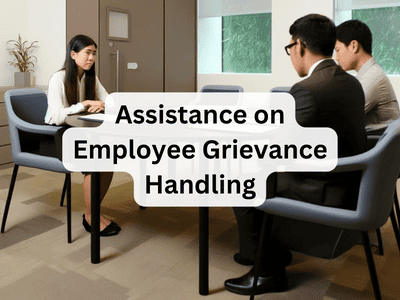This post is also available in:
![]() 简体中文 (Chinese (Simplified))
简体中文 (Chinese (Simplified))
Employee Grievance Handling – Our Professional Human Resource Personnel is Ready to Assist You!
 Generally defined as the formal notice of employee’s dissatisfaction, employee grievance is often caused by mismanaged expectations that led to discontentment among employees. Grievance handling is, in fact, an important function of the company human resource department. Many times, complaints or negative remarks, are associated with inadequacy of remuneration (salary cut, demotion, and etc.), or job dissatisfaction, or other aspects of employment.
Generally defined as the formal notice of employee’s dissatisfaction, employee grievance is often caused by mismanaged expectations that led to discontentment among employees. Grievance handling is, in fact, an important function of the company human resource department. Many times, complaints or negative remarks, are associated with inadequacy of remuneration (salary cut, demotion, and etc.), or job dissatisfaction, or other aspects of employment.
Grievance usually begins when the employee starts to complain or merely vents his or her dissatisfaction verbally to anyone who listens to him or her. It becomes a grievance when the employee formalizes it, in most cases is via a formal complaint in writing and submits it to the appropriate authority.

Why Does Your Company Need Employee Grievance Handling?
Most grievances will cause some disturbance in the workplace where negative comments or complaints may affect employee’s morale, productivity, and performance. As such, the employer should communicate and manage the situation promptly instead of leaving it unaddressed.
Therefore, a good employee grievance handling policy will, in fact, ensure immediate attention in addressing complaints to avoid the bitterness and frustration due to delay. It is because when an employee expresses his or her dissatisfaction in formal writing, the action cannot be taken lightly but must be handled with a swift resolution.
Handling of Employee Complaints
Although employee grievance is undesirable in nature, it should be dealt with directly and not be overlooked. Therefore, it is important for every business, regardless of its size and business type, to have a formal grievance-handling procedure in place. Every employer has to develop grievance-handling mechanisms to manage complaints and human resource department should communicate these grievance-handling procedures with employees, be it through a briefing session or employee handbook or any communication channel.
On top of that, human resource personnel and employees with staffing responsibilities have to be trained and equipped with the knowledge to handle grievances professionally, e.g. how to be objective and open-minded when dealing with complaints and grievances.
Key Points for Complaints Handling
Here is the quick list that summarises the key points for grievance handling:
- Take ownership in all complaints handling.
- Carry out sufficient investigations.
- Respond to the affected person/complainant/aggrieved employee immediately. If you require more information on that situation, be sure you communicate that to the complainant instead of leaving it unexplained.
- Keep the information of the said grievances private and confidential.
You can also refer to The Grievance Handling Handbook for more practical tips in grievance handling within the workplace and how to formulate a grievance-handling process.
For Job Applicants and Employees
There will be times that job applicants or your employees might feel discriminated against. As an employer, you can offer them the chance to get the clarification or an explanation from the hiring manager or employee in charge before escalating the issue further. With that, you will have an opportunity to explain the hiring manager’s (or person in charge) decision and take remedial action where necessary. This would, for one, avoid misunderstanding, and maintain a positive employer-employee relationship.
Employee grievance handling remains to be a serious and sensitive issue in a company. If you need assistance or advice on how to formulate the employee grievance handling process or related policy in your company, 3E Accounting is here ready to help. Our professional human resource personnel will guide you through the process and help you to develop the mechanism to manage grievances among employees. Contact us today for more information!



